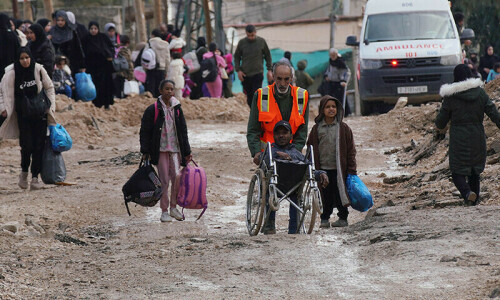GILGIT: World Wildlife Fund (WWF) in collaboration with Gilgit-Baltistan wildlife and parks department and a private school celebrated the International Snow Leopard Day in Hoper valley of Nagar district on Saturday with an aim to improve knowledge and understanding about the threats the climate change has posed to the existence of snow leopard.
According to WWF officials, only 200 to 350 snow leopards are estimated to be left alive in Pakistan, 80 per cent of which are found in mountainous areas of GB, while the rest are in Khyber Pakhtunkhwa and AJK.
Speakers at an event held to mark the day said GB snow leopards were endangered due to threats that included poaching and persecution, poisoning of carcasses of their livestock by local herding communities.
The cat lovers across the world celebrate the International Snow Leopard Day on Oct 23.
Local youth, elders, students, teachers and livestock herders, officials of WWF, and GB wildlife and parks department were in attendance.
The purpose of the awareness programme was to impart knowledge about climate change impacts and importance of snow leopard for the health of mountain ecosystems.
On the occasion, Saeed Abbas, GB regional head of WWF-Pakistan, said the snow leopard was the symbol of Asia’s high mountains, which played a vital role as the indicator of ecosystem health in the harsh terrain.
He said the leopard was increasingly threatened across its range due to a number of threats, including human-snow leopard conflict, climate change, habitat fragmentation, reduction of prey base. Mr Abbas also emphasised developing and implementing human-wildlife conflict mitigation and climate change adaption plans in the entire habitat of wild cat. He said according to a survey around 10 snow leopards had been killed throughout Gilgit-Baltistan per year between 1980 and 2000. He added between 2005 to 2015 72 leopards were killed in 22 valleys of GB.
Farmers in the areas used to kill snow leopards by poisoning the carcasses of their livestock or shooting to protect their livestock from prey of snow leopards.
GB wildlife and parks department conservator Yaqoob Ali Khan highlighted the importance of climate change impacts and urged mass level plantation measures as mitigation and developing climate change adaptation plans to cope with changing climatic conditions.
Published in Dawn, October 29th, 2017














































